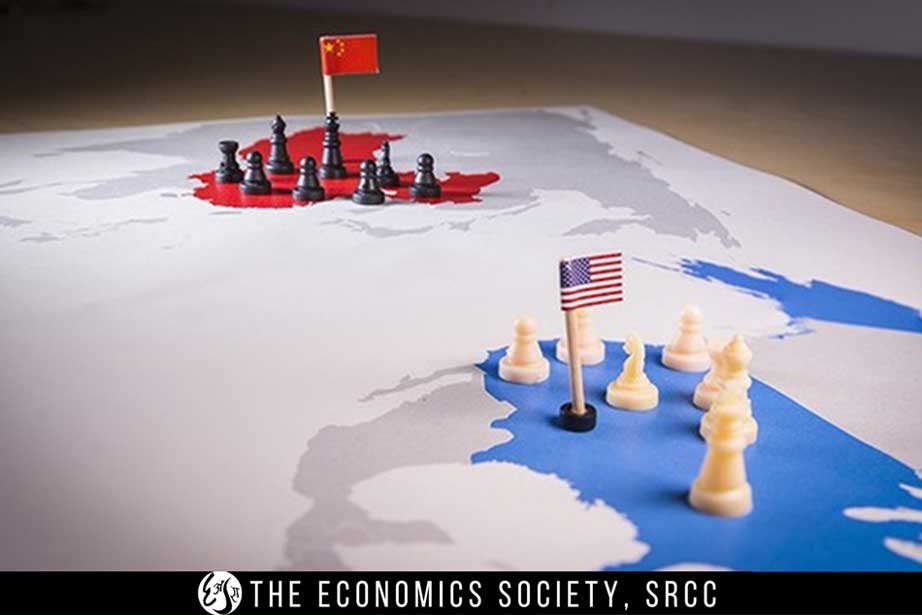It wasn’t many years back that the world was largely dominated by a few European players. The British, the French and the Dutch, to name a few, had control over a majority of the world through colonization. However, when World War II ended, decolonization swept the world. From Chad in Africa to India in South Asia, many colonies demanded independence. Colonialism in the Imperial Era constituted direct control over a country. Veering from classical colonialism, countries seem to have adopted 'neo-colonialism’. First coined by Kwame Nkrumah, neo-colonialism is colonialism of the 21st century. The subjugated countries, in theory, are independent to make their policies and decisions but in practice, their political and economic system is deeply governed from outside.
Kwame prudently captured the spectacle, stating, ‘‘in an extreme case, the troops of the imperial power may garrison the territory of the neo-colonial State and control the government of it. More often, however, neo-colonialist control is exercised through economic or monetary means.’’ Though the concept of classical colonization has now ceased to exist, the People’s Republic of China has emerged as the forerunner in ‘neo-colonialism’. Its rising investment in the developing countries coupled with its history of interference in local politics has raised some concerns. But is China the first country to have adopted neo-colonialism? Map showing the parts of the world which were once colonized by the European powers. Source: world101.cfr.org The Chinese Belt and Road Initiative (BRI) was undertaken to enhance regional connectivity by building a huge network of roads, railways and sea routes through the continents of Asia, Europe and Africa. Moreover, China has been providing loans to these countries to shoulder the endeavour in their respective regions.
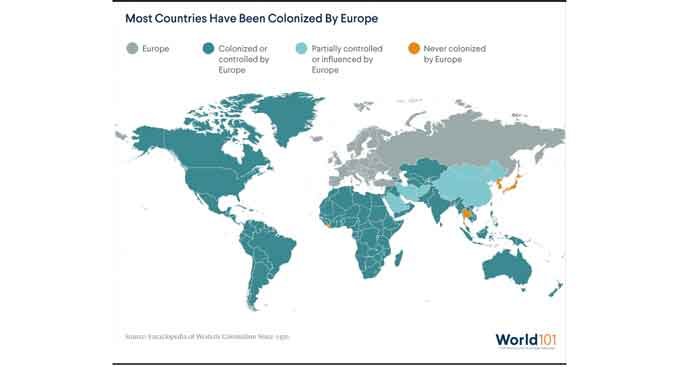
However, through debt diplomacy, many countries are now vulnerable to the possibility of landing in a debt trap. Sri Lanka and Pakistan were victims of this entrapment and were compelled to lease out their strategic ports to China. These lending have risen to almost 700 billion dollars, with a considerable amount being lent to the African countries. Using its own brand of ‘debt trap diplomacy’, China will have the power to acquire land, set military bases or dominate those poor countries who are unable to pay back their loans.
Apart from its gain from the bad debt countries, the lender has the influential power to dictate the political decisions in all borrower nations. China has not only used monetary means of control to acquire power but has also exercised military action against its neighbours. China is currently in territorial disputes with 18 countries despite having borders with only 14 of them. Since the UN was set up, it has become increasingly difficult for countries to quench their thirst for imperialism. Nevertheless, China has been violating international law while simultaneously creating a veneer of legal legitimacy for its position. It has been involved in several military manoeuvres in the South China Sea, where it is creating artificial islands to claim the sea in order to gain a strategic advantage in global trade. The White House had issued a statement criticizing these moves, stating, ‘China is engaged in provocative and coercive military and paramilitary activities in India and other neighbouring countries as it attempts to eliminate perceived threats to its interests and advance its strategic objectives globally.’
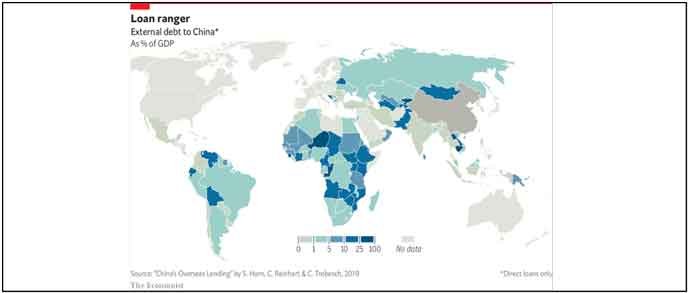
Map showing the extent of debt to China of countries across the world. Source; economist.com The United States, which has heavily criticised China’s imperialist moves, is guilty of the same crime. Though the methods are different, the objective is the same; world domination. While China has been using debt diplomacy as its chief instrument, the USA uses its geopolitical advantage to dictate upon the other countries. With the advent of globalization, underdeveloped countries are more and more vulnerable to neo-colonialism. These nations are heavily dependent on the developed economies for advanced goods and services.
They are impelled to act according to the developed nations’ wishes to prevent straining of trade relations or implementation of legal or financial sanctions. The United States has exploited this to export its views on nations. India for decades had wished to develop the Chabahar Port in Iran that would open a transport corridor to Central Asia and Afghanistan. However, due to fear of US sanctions, it backed down. It was only when the US lifted the Iranian sanctions in 2015, that India made headway with the development. In the Imperial era, the colonial powers would invade and exploit the land and people of their colonies.
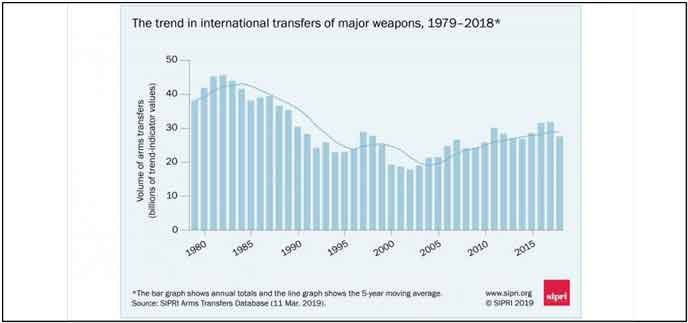
However, now wars are fought, lives are lost but the governments involved are mere puppets such as in the case of the Middle East. The western powers such as the USA and France, export copious amounts of arms to the Middle East. The arms transfer witnessed an increase of 7.8 per cent in 2014-18 as compared to 2009-13. What earlier was a war involving the soldiers of the colonists, has now been transformed into abetting wars in a foreign land through arms supply to such nations. Graph depicting the increase in arms sales in recent years to the Middle East. Source: sipri.org Moreover, Saudi Arabia and Iran have been in a proxy war for decades due to their ideological differences. The two countries finance rival sides and militia in regional conflicts in a struggle to prove their dominance in the region. What seems like a war in Syria and Yemen, and political upheavals in Lebanon and Iraq, is truly a cold war behind the curtains. The two powers are instigating wars in their neighbouring areas by supplying arms to their allies.
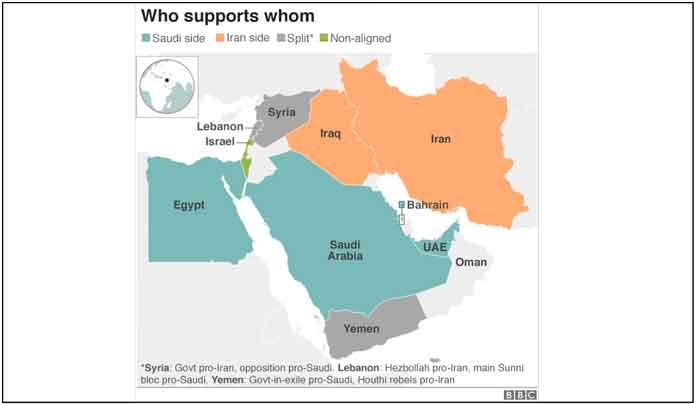
When Iran was supporting the Shia leaders in Bahrain to overthrow the government, Saudi Arabia provided military aid to the government to quash the unrest. Map depicting the proxy war in the Middle East. Source: bbc.com The common characteristic amongst all the colonists, both in the past and the present, is them being one of the superpowers yet striving for more. While the US, China and France are global powers, Saudi Arabia and Iran are the superpowers of their region. China’s actions may be highlighted in the current situation, but it is not the only country with such opportunistic intentions. The positions of these superpowers keep changing. However, each has the same agenda of keeping their powers intact, irrespective of whether it causes political upheaval elsewhere. It is crucial that media outlets and NGOs stop falsely claiming that western countries are generally playing a positive or ‘leadership’ role in international development. They must expose the reality behind their financial and military help to these developing nations and focus advocacy away from aids and towards the root causes of poverty.
Bhavika Agrawal
Writing Mentorship, 2021

